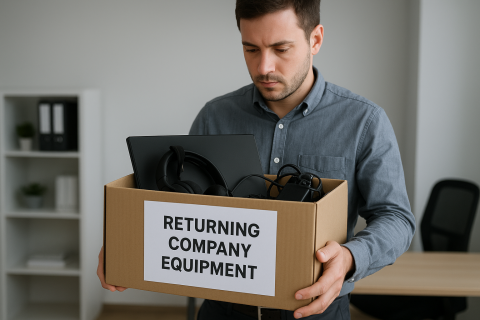Final Paychecks and Company Equipment

Question: An employee recently resigned and hasn’t returned company equipment. Can we hold their final paycheck until we get everything back?
The short answer: No, you cannot hold or delay a final paycheck while waiting for company equipment to be returned.
Federal law requires that employees receive their final paycheck no later than their next regular payday. Many states go a step further, requiring payment even sooner – sometimes immediately upon termination (see below for Wisconsin and Illinois guidance). These rules apply regardless of whether the employee still has company property in their possession.
So what can you do instead? Make the return process as straightforward as possible. A few practical options
include:
- Scheduling a drop-off time at your office
- Providing a pre-paid shipping label and box for easy return
- Arranging for a courier to pick up the items directly
We recommend sending a clear email or letter to the former employee that lays out these options and provides a firm return-by date. This letter could be as friendly or as formal as desired, based on your relationship with the employee.
Wisconsin Law
In Wisconsin, employers must issue a departing employee’s final paycheck by the next regular payday, regardless of whether company property has been returned. Under Wisconsin Statutes § 103.455, employers cannot withhold or deduct any portion of an employee’s pay (including the final paycheck) to recover equipment or property, unless certain conditions are met.
Illinois Law
The Illinois Wage Payment and Collection Act (820 ILCS 115/5) mandates that all final compensation, including wages, bonuses, and commissions, must be paid on the next regularly scheduled payday following the employee's separation from employment. Employers are not permitted to delay this payment pending the return of company property.
Important note: This guidance is for general informational purposes only. It is not legal advice. Please contact
your attorney for further information and instruction.
